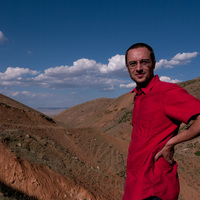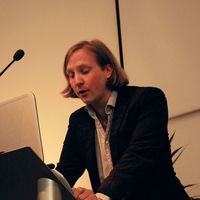
Cornel du Toit
Related Authors
Armando Salvatore
McGill University
Richard Menary
Macquarie University
David Seamon
Kansas State University
Armando Marques-Guedes
UNL - New University of Lisbon
Ned Block
New York University
Stefan Kristensen
Université de Strasbourg
Egil Asprem
Stockholm University
Eros Carvalho
Universidade Federal do Rio Grande do Sul
Julian Strube
University of Göttingen
Karen Ng
Vanderbilt University









Uploads
Papers by Cornel du Toit
In this contribution, an overview of distinct ways in which the interplay between knowledge, values and beliefs took shape in the South African context since 1948 is offered. This is framed against the background of the paleontological significance of South Africa and an appreciation of indigenous knowledge systems but also of the ideological distortion of knowledge and education during the apartheid era through the legacy of neo-Calvinism. The overview includes references to discourse on human rationality (as an implicit critique against ideology), on the use of social sciences in theological reflection, on the teaching of evolution in public schools, on science and religion, and on religion and ecology. The essay concludes with a survey of some of the major voices regarding the interface between religion and science in South Africa.
The article examines episodes in genesis thinking and some important developments up to the present in physical science, philosophy, theology and jurisprudence. These sciences all passed through much the same evolution. They discovered laws that determined the origin of things and these were intimately linked with God or the supernatural. Round about the time of the scientific revolution the various sciences started making a distinction between nature and super-nature and the laws governing the order of nature were explored independently (empirically and rationally). Nowadays very few disciplines, in their respective fields, reduce the origin to law(s). Indeed, the notion of law being the origin is considered reductionist. Genesis thinking has to allow for a multiplicity of factors governing reality and find meaning in that complexity.
This article examines the development of epistemology in the modernist era. Knowledge systems are inconceivable unless conceptualised epistemologically. But what is to be done if epistemology leads us to discover that knowledge is a mystery? Hence the focus is on post‐foundationalism/post‐epistemology, which stresses that all knowledge systems, for all their professions of neutrality and objectivity, are merely reflections of the dimensions of human nature. This highlights the importance of virtue epistemology, which epitomises all these dimensions. This implies balancing local and universal aspects of knowledge. Such a balance is possible in the African context, a hybrid of global and local cultures, which displays both modern and postmodern traits. The article concludes with a reference to the power strategies underlying knowledge systems. The emphasis is on human self‐understanding as an essential requirement for knowledge.
so much a comparison between Biko and Bonhoeffer’s thinking as it is a focus on one aspect of
Bonhoeffer’s thinking, namely the insistence on independence and self-responsibility in your
own situation, which is a premise of Biko’s thinking. As the father of Black Consciousness in
South Africa, Biko laid the foundation for black self-understanding and self-responsibility. Th e
value of his thinking lies in a hermeneutics of consciousness, which he established and which is
a presupposition of his ideals of self-responsibility and self-emancipation. Biko’s hermeneutics of
the self is considered with reference to the forces that kept black people captive. Although Black
Consciousness is seen as a historically contingent phenomenon, the challenge of black liberation
remains. Biko’s legacy is vital for the establishment of a hermeneutics of poverty and freedom,
which is presented as a condition for African liberation in the 21st century.
post-metaphysical, anti-fundamentalist, immanent transcendent, corporeal, narrative,
holistic and secularly spiritual. As examples of the kind of Reformed belief that is increasingly
questioned it examines the doctrine of revelation, the doctrine of God and of salvation, with
proposals of how they could be accommodated in an immanent transcendent model. Philosophy
of consciousness (with reference to Hegel and Sartre) serves to clarify the transcendentally wired
nature of human consciousness. The underlying question is how affect can be understood in a
rational, epistemological framework. Human consciousness has to be linked to bodily functions,
more especially emotions, to appreciate how religious experience occurs in a secular spiritual
context. Narrative is spotlighted as the medium that is pre-eminently suited to convey a holistic
concept of religious experience.
The article expands on some theological motives in Dante’s work. Dante’s combination of historical facts with imaginative depictions thereof is compared with the notion of immanent transcendence. Immanent transcendence in this context describes the movement from the quotidian and historical to the imaginative transcendent world that accommodates the mystical. Reference is made to the role of human biology, science and the subconscious in Dante’s work. In this context dream and dance is suggested as important mystical metaphors.
The question of what life is cannot be viewed in isolation. Nor is it easy to explain how the various levels interrelate and eventually give rise to intelligent consciousness. Hence the question must focus on transitions from lower to higher levels of complexity. Crucial among these are the transition from nonlife to life; from the quantum realm to that of classical physics; the evolutionary transitions between diverse forms of life; the transition from matter (brain) to mind; and the transition between immanent and transcendent forms of consciousness.
The mystery of life derives from its scope and openness. Discovery of its components made it possible to reduce it to one of its parts. To obviate that reduction we turn to the whole and its mysterious transitions, which necessarily entails a speculative element. Our a posteriori knowledge is inevitably followed by models based on a priori intuition. That is where awareness of the transcendent (religion) fits in.
The emergence model promises to explain the transitions. At any rate it is an improvement on earlier notions of linear causality.
their implications for a religious doctrine of creation. The assumption is that scientific
insights that are accepted on solid grounds will influence belief, but will not replace
or terminate it. Some aspects of particle physics provide a background to explain the
importance of the discovery of the Higgs boson. The question is: can science serve as
the final explicator of the world? After looking at the role of metaphysics and truth in
science, we briefly consider some unsuccessful attempts to assign God a demonstrable
place in physical reality. Would that necessarily imply a creator God? The role of belief
in creation in the origin and development of religions is traced in order to determine
whether religions entailing such a belief are viable, with due regard to the impact of
worldview and evolution on the doctrines of creation and God. In conclusion we look
at the distinctive contribution of religion to human life with reference to the role of
emotion and affect.
environmental, societal, personal and religious. Mostly, however, we are oblivious of the
causal factors, many of which may function on a biological level or subconsciously, although
the emotional effect is experienced physically and consciously. Emotions change as the trigger
mechanisms in the cultural context change. This usually happens unnoticed over long periods.
Internet databases have now made it possible to study the use of emotive words; this point
is discussed. Of particular interest is the interaction between emotion and reason. Models
that reduce emotion to the physical level are scrutinised critically. Reason is not emotionless
and emotion is not always irrational. The close interrelationship of emotion and reason often
makes it difficult to distinguish accurately between the two. The so-called affective turn takes
cognisance of cultural, social, religious and other environmental factors; this broader approach
clarifies the importance of affect’s role in rationality. One way of viewing emotion and affect
is to look at the accompanying language; here the role of metaphor and narrative is pertinent.
The traditional elevation of reason above emotion is examined critically as part of the affective
turn that broadens the meaning and scope of emotions. I focus on the role of emotion in
religion and factors that influence it, and explore the accent of affect in new spiritualities.
In this contribution, an overview of distinct ways in which the interplay between knowledge, values and beliefs took shape in the South African context since 1948 is offered. This is framed against the background of the paleontological significance of South Africa and an appreciation of indigenous knowledge systems but also of the ideological distortion of knowledge and education during the apartheid era through the legacy of neo-Calvinism. The overview includes references to discourse on human rationality (as an implicit critique against ideology), on the use of social sciences in theological reflection, on the teaching of evolution in public schools, on science and religion, and on religion and ecology. The essay concludes with a survey of some of the major voices regarding the interface between religion and science in South Africa.
The article examines episodes in genesis thinking and some important developments up to the present in physical science, philosophy, theology and jurisprudence. These sciences all passed through much the same evolution. They discovered laws that determined the origin of things and these were intimately linked with God or the supernatural. Round about the time of the scientific revolution the various sciences started making a distinction between nature and super-nature and the laws governing the order of nature were explored independently (empirically and rationally). Nowadays very few disciplines, in their respective fields, reduce the origin to law(s). Indeed, the notion of law being the origin is considered reductionist. Genesis thinking has to allow for a multiplicity of factors governing reality and find meaning in that complexity.
This article examines the development of epistemology in the modernist era. Knowledge systems are inconceivable unless conceptualised epistemologically. But what is to be done if epistemology leads us to discover that knowledge is a mystery? Hence the focus is on post‐foundationalism/post‐epistemology, which stresses that all knowledge systems, for all their professions of neutrality and objectivity, are merely reflections of the dimensions of human nature. This highlights the importance of virtue epistemology, which epitomises all these dimensions. This implies balancing local and universal aspects of knowledge. Such a balance is possible in the African context, a hybrid of global and local cultures, which displays both modern and postmodern traits. The article concludes with a reference to the power strategies underlying knowledge systems. The emphasis is on human self‐understanding as an essential requirement for knowledge.
so much a comparison between Biko and Bonhoeffer’s thinking as it is a focus on one aspect of
Bonhoeffer’s thinking, namely the insistence on independence and self-responsibility in your
own situation, which is a premise of Biko’s thinking. As the father of Black Consciousness in
South Africa, Biko laid the foundation for black self-understanding and self-responsibility. Th e
value of his thinking lies in a hermeneutics of consciousness, which he established and which is
a presupposition of his ideals of self-responsibility and self-emancipation. Biko’s hermeneutics of
the self is considered with reference to the forces that kept black people captive. Although Black
Consciousness is seen as a historically contingent phenomenon, the challenge of black liberation
remains. Biko’s legacy is vital for the establishment of a hermeneutics of poverty and freedom,
which is presented as a condition for African liberation in the 21st century.
post-metaphysical, anti-fundamentalist, immanent transcendent, corporeal, narrative,
holistic and secularly spiritual. As examples of the kind of Reformed belief that is increasingly
questioned it examines the doctrine of revelation, the doctrine of God and of salvation, with
proposals of how they could be accommodated in an immanent transcendent model. Philosophy
of consciousness (with reference to Hegel and Sartre) serves to clarify the transcendentally wired
nature of human consciousness. The underlying question is how affect can be understood in a
rational, epistemological framework. Human consciousness has to be linked to bodily functions,
more especially emotions, to appreciate how religious experience occurs in a secular spiritual
context. Narrative is spotlighted as the medium that is pre-eminently suited to convey a holistic
concept of religious experience.
The article expands on some theological motives in Dante’s work. Dante’s combination of historical facts with imaginative depictions thereof is compared with the notion of immanent transcendence. Immanent transcendence in this context describes the movement from the quotidian and historical to the imaginative transcendent world that accommodates the mystical. Reference is made to the role of human biology, science and the subconscious in Dante’s work. In this context dream and dance is suggested as important mystical metaphors.
The question of what life is cannot be viewed in isolation. Nor is it easy to explain how the various levels interrelate and eventually give rise to intelligent consciousness. Hence the question must focus on transitions from lower to higher levels of complexity. Crucial among these are the transition from nonlife to life; from the quantum realm to that of classical physics; the evolutionary transitions between diverse forms of life; the transition from matter (brain) to mind; and the transition between immanent and transcendent forms of consciousness.
The mystery of life derives from its scope and openness. Discovery of its components made it possible to reduce it to one of its parts. To obviate that reduction we turn to the whole and its mysterious transitions, which necessarily entails a speculative element. Our a posteriori knowledge is inevitably followed by models based on a priori intuition. That is where awareness of the transcendent (religion) fits in.
The emergence model promises to explain the transitions. At any rate it is an improvement on earlier notions of linear causality.
their implications for a religious doctrine of creation. The assumption is that scientific
insights that are accepted on solid grounds will influence belief, but will not replace
or terminate it. Some aspects of particle physics provide a background to explain the
importance of the discovery of the Higgs boson. The question is: can science serve as
the final explicator of the world? After looking at the role of metaphysics and truth in
science, we briefly consider some unsuccessful attempts to assign God a demonstrable
place in physical reality. Would that necessarily imply a creator God? The role of belief
in creation in the origin and development of religions is traced in order to determine
whether religions entailing such a belief are viable, with due regard to the impact of
worldview and evolution on the doctrines of creation and God. In conclusion we look
at the distinctive contribution of religion to human life with reference to the role of
emotion and affect.
environmental, societal, personal and religious. Mostly, however, we are oblivious of the
causal factors, many of which may function on a biological level or subconsciously, although
the emotional effect is experienced physically and consciously. Emotions change as the trigger
mechanisms in the cultural context change. This usually happens unnoticed over long periods.
Internet databases have now made it possible to study the use of emotive words; this point
is discussed. Of particular interest is the interaction between emotion and reason. Models
that reduce emotion to the physical level are scrutinised critically. Reason is not emotionless
and emotion is not always irrational. The close interrelationship of emotion and reason often
makes it difficult to distinguish accurately between the two. The so-called affective turn takes
cognisance of cultural, social, religious and other environmental factors; this broader approach
clarifies the importance of affect’s role in rationality. One way of viewing emotion and affect
is to look at the accompanying language; here the role of metaphor and narrative is pertinent.
The traditional elevation of reason above emotion is examined critically as part of the affective
turn that broadens the meaning and scope of emotions. I focus on the role of emotion in
religion and factors that influence it, and explore the accent of affect in new spiritualities.